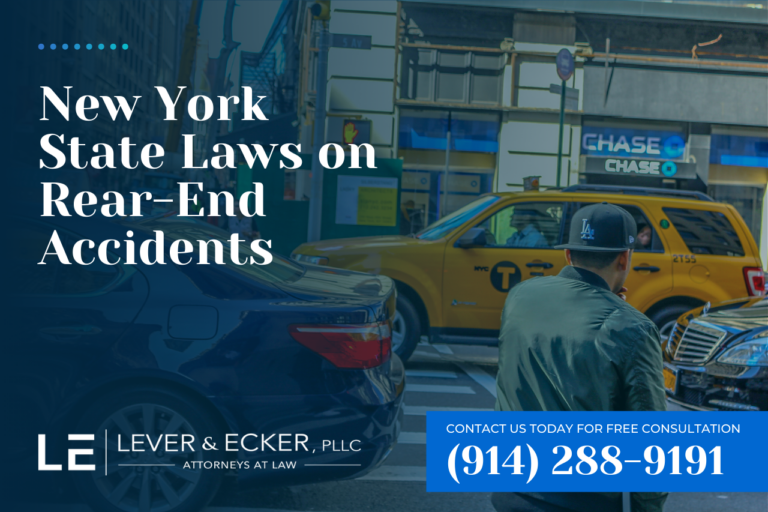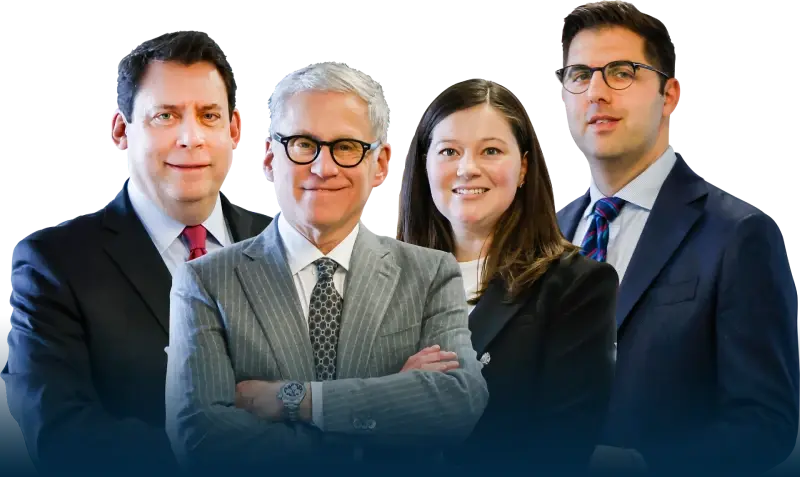Table of Contents
- Who Is Presumed to Be at Fault in a Rear End Collision in New York?
- What Is New York’s Law on Tailgating?
- What Is the Responsibility of the Rear Ending Driver After a Crash in New York?
- Valid Reasons Rear End Drivers May Not Be At Fault
- Can You Still Recover Damages if You’re Partially at Fault in a Rear End Collision in New York?
- What Are the Reporting Requirements for Rear End Accidents in New York?
- When Should You Seek Legal Assistance After a Rear End Collision?
- Our Rear End Car Accident Attorneys Can Help
Who Is Presumed to Be at Fault in a Rear End Collision in New York?
In New York, drivers who rear-end other vehicles are generally presumed to be at fault, typically for not maintaining a safe following distance. This is based in substantial part on New York Vehicle and Traffic Law § 1129(a), which requires drivers to follow other vehicles at a “reasonable and prudent” distance given the speed limit, traffic conditions, weather, and other factors.
Following distance is a key factor in establishing fault in rear end accidents. However, while the rear-ending driver is generally considered responsible, there are limited instances in which the rear driver can be absolved of liability, if they can show they drove prudently and properly under the circumstances and the accident was someone else’s fault.
What Is New York’s Law on Tailgating?
Again, under VTL § 1129(a), tailgating is prohibited—-vehicles cannot follow each other more closely than they reasonably should. Tailgating can lead to rear end accidents since the following vehicle might not have time to stop if the leading vehicle suddenly slows down or stops, as often occurs in the normal course of driving. Though the statute does not define a “reasonable and prudent” distance, drivers should gauge their distance based on road conditions, giving themselves plenty of room to stop or slow down unexpectedly so as to avoid a collision with the vehicle in front of them.
What Is the Responsibility of the Rear Ending Driver After a Crash in New York?
Failing to maintain a safe following distance is often enough to establish negligence against the rear driver. After a rear end collision, the burden of proof is generally on the rear-ending driver to disprove their liability. If they fail to satisfy that burden, they will be held liable and responsible for compensating others injured in the crash.
Valid Reasons Rear End Drivers May Not Be At Fault
There are several potential “non-negligent explanations” that can eliminate or reduce the liability of a rear-ending driver. These explanations may shift the blame for the accident to someone else or allege a non-human cause.
For example, as one court explained, “A non-negligent explanation may include that a vehicle made a sudden lane change in front of a defendant’s vehicle, forcing the defendant to stop suddenly.” Other examples include:
- The lead car stops unreasonably or without warning, leaving no time to react.
- A third party’s reckless behavior, such as cutting off the defendant, causes the collision.
- A sudden hazard or object in the road forces the defendant to brake abruptly.
- Poor weather or road hazards, like black ice, make stopping safely impossible.
- Faulty brakes or brake lights.
Can You Still Recover Damages if You’re Partially at Fault in a Rear End Collision in New York?
Under the New York comparative negligence rule, someone injured in an accident can still seek compensation even if they were partially responsible for the accident. However, any damages they receive will be reduced proportionally to their percentage of fault. For example, if an injured person is determined to be 10 percent at fault for an accident and suffers $100,000 in damages, their compensation is reduced to $90,000.
What Are the Reporting Requirements for Rear End Accidents in New York?
Under New York no-fault insurance laws, car accident victims may avail themselves of available personal injury protection (PIP) insurance. However, they must report the accident to the involved insurance companies within 30 days to preserve coverage.
Further, if they suffered a “serious injury,” as defined under New York’s Insurance Law, they can file an additional fault-based lawsuit or insurance claim. The New York personal injury statute of limitations normally gives accident victims three years from their date of injury to file a lawsuit, although this deadline may be far shorter under certain circumstances.
Additionally, under New York Vehicle and Traffic Law § 605, drivers must report accidents within 10 days if they involve more than $1,000 in property damage, physical injury, or death. They can do so by submitting a Report of Motor Vehicle Accident form to the New York DMV. Failure to report can result in license suspension.
When Should You Seek Legal Assistance After a Rear End Collision?
After a rear end collision, you should seek legal advice as soon as possible. Navigating the aftermath of a rear end car accident can be complicated, and consulting an experienced personal injury attorney is the best way to understand and protect your legal rights and options. Our skilled attorneys can gather all available evidence to prove your claim and ensure no crucial deadlines are missed.

Daniel G. Ecker
Founding Partner
Our Rear End Car Accident Attorneys Can Help
With offices in White Plains, the Bronx, and Queens, Lever & Ecker helps injured clients throughout New York State, including all five boroughs of New York City, all of Westchester County, and the surrounding counties. Our experienced car accident attorneys have a 99 percent success rate, and our clients can expect top-tier legal representation with an open line of communication. We make home and hospital visits, so if you can’t come to us, we’ll come to you. Call (914) 288-9191 or contact us online to schedule a free, no-obligation consultation.


